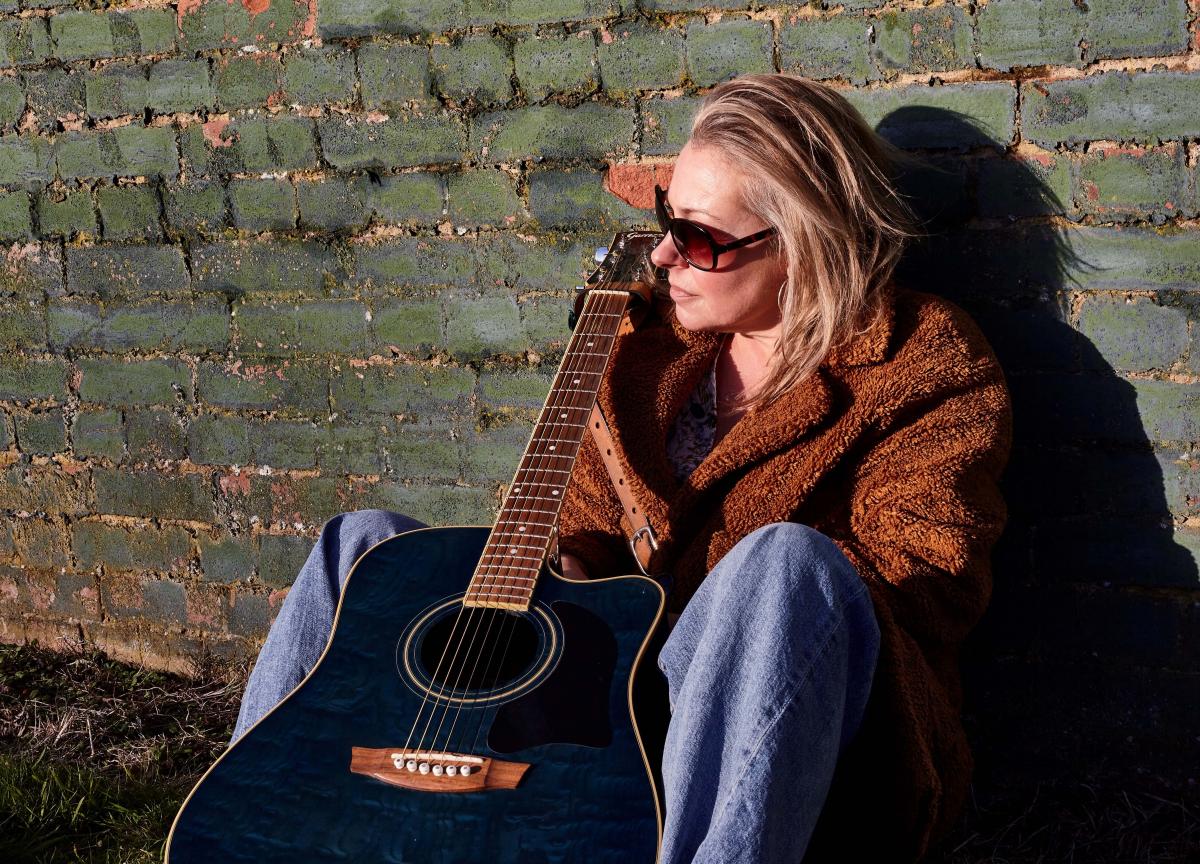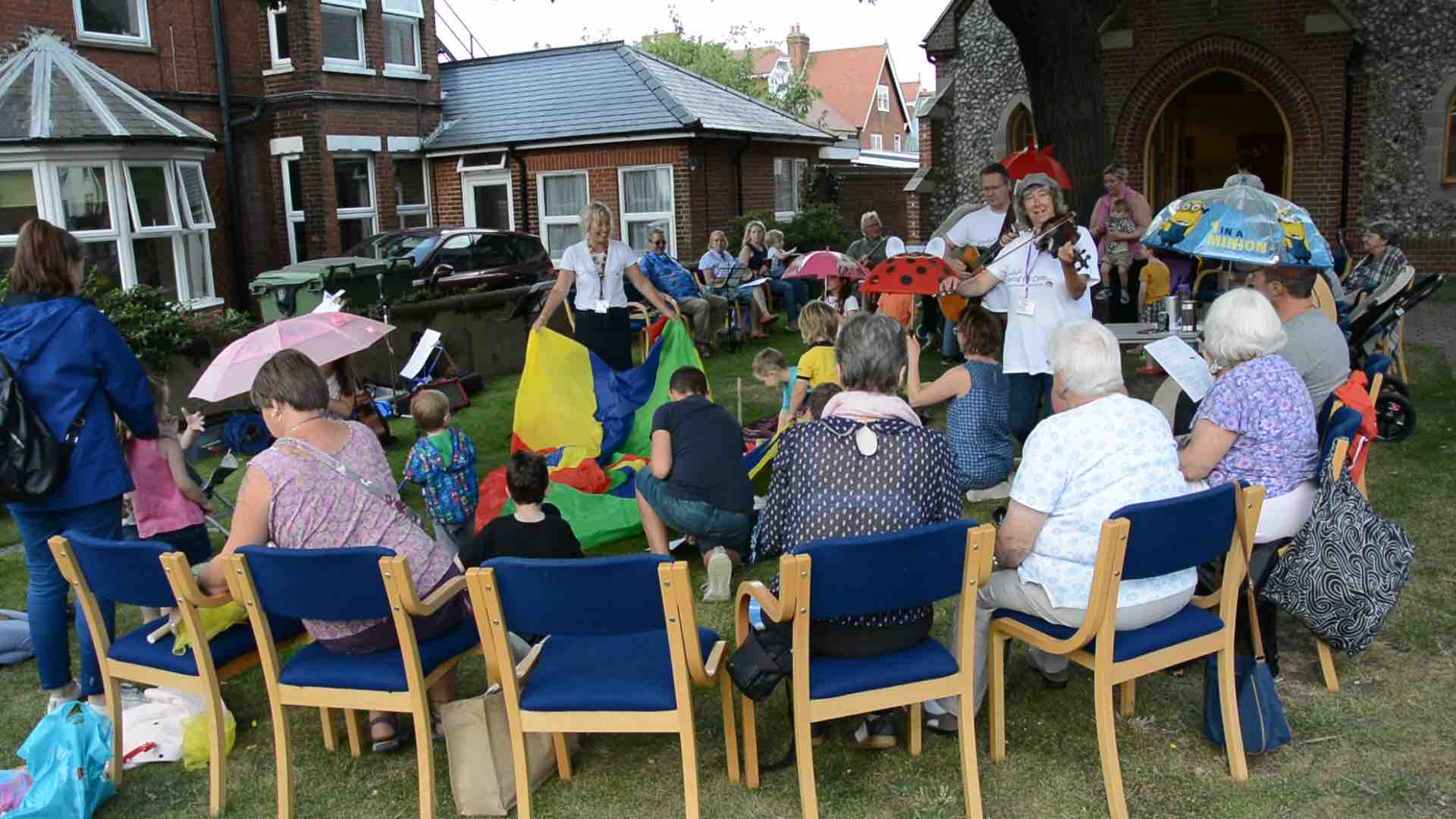
How has engaging with arts/culture/heritage improved your life?
Engaging with the creative arts – mainly with music – has literally transformed my life. It is something I should always have done, if I had known it was possible, understood myself better and had the confidence and opportunities when I was younger! I grew up in a very rural location so transport and accessibility were big issues. I left school to work in an office job, turning down places at colleges (including an Art College!) because this seemed a ‘safe’ bet. I think I was just too scared to up-root from my village and live-in at college (which would have been necessary due to the transport links).
I married young and had two wonderful children and basically kept treading the same pathways through administration and IT based jobs to pay the bills and keep a home together. These weren’t particularly enjoyable, but I had an aptitude for them so I just accepted that’s what working life just has to be.
I became depressed, a condition that was significantly exacerbated by a hysterectomy when I was only 30, which triggered the early menopause. Who knows anything about that at 30 (and particularly back in the 1990’s as literally, no-one talked about it!). I thought was going mad. I couldn’t concentrate, had terrible brain fog, developed breathing difficulties and was literally exhausted. Coinciding with a marriage breakdown, several house moves, more studies and job promotions, I broke down in 2005. This mental breakdown, and accompanying therapy sessions, brought back some issues from childhood which needed to be worked through as part of my recovery (yeah, ‘me too’).
I recall sitting at home, following a counselling session, thinking about who I was when I was little. What did I like doing? What did I enjoy? Who was I before ‘life got in the way’? I remembered I still had a guitar my mother bought me when I was 10. I was desperate to learn the guitar at the time, inspired by a teacher at primary school. I loved playing music! My mother, despite being a single parent and not having much money to spare, had also paid for piano lessons. My long-term partner at the time was tremendously encouraging, himself also playing guitar a little.
Slowly but surely, the act of playing guitar and singing literally helped get me on my feet again. A friend encouraged me to attend some community folk nights – I remember my hands literally shaking when I first tried playing guitar in front of people!
I returned to work on a part-time basis and auditioned for a place at Access to Music in Norwich. This resulted in my RSL Level 2 Diploma as a Performing Musician in 2007.
I had the opportunity to consider going on to a degree level course in music but, again, I was concerned about job opportunities, financial security and basically being able to support myself. With these things in mind I choose another 'more sensible route' which might offer more/safer work prospects. Based on previous work experience and interest in community and sustainable development, I was offered a place at The University of East Anglia (UEA) to study Environmental Sciences. This route would also offer travel opportunities which I'd also identified as being important to me, going forward. As my children had now grown up it meant I had more flexibility for this too.
During my time at the UEA, I took every opportunity possible to travel, working or studying in Ireland, Greece, Australia and Brazil. Following my award of First Class at degree level I was offered a funded research programme, finally finishing my studies in 2016 with a doctorate! I am extremely grateful for these experiences however conducting research meant long periods of desk work again, something which I don’t enjoy and which has left me with significant upper spinal issues. I found myself, once again, turning to singing and music as a means of managing bouts of depression and anxiety.
I started playing music with someone locally who was learning the double bass. Following the joining of another friend who played piano, we formed a trio which had the ambitious aims of playing around local tea shops and restaurants, literally often being paid in tea and cake. We adopted the name, Playing for Cake!
When one of the band members developed early-onset dementia, we kept playing with him at home, which brought tremendous relief and delight to him. It also meant his wife could get some respite while we were with him. I realized there were significant gaps and lack of opportunities locally around singing or music-making for health and wellbeing.
Once I finished my studies in 2016, based on my own personal experiences, I decided (with the help of some friends and colleagues!) to set up a not-for-profit community group to provide more people with opportunities to engage with music for the benefit of their health and wellbeing, keeping the name Playing for Cake in memory of our close friend, who would have loved the work we are doing now. In fact, in the early days, he was able to come with us and take part in the sessions we ran.
Since setting up Playing for Cake, I have trained as a Singing for Health Practitioner, learning from courses in Singing for Lung Health (British Lung Foundation, as it was at the time) and Sing to Beat Parkinson’s. I also song-write and perform with a band called Cutting the Mustard. I’ve recently enjoyed some collaborations with young, arts graduates, producing some animations with accompanying songs published on YouTube and my website .
One of the songs is called Mask and is based on someone locking their true selves away and putting on a persona they’ve adopted to cope but to the benefit of their life and mental health. It shows a person, with someone’s help, breaking out into the world to a richer and more full life. This, in summary, is my experience, through engaging with the arts.
Why do you think that culture and creativity are important for wellbeing?
I believe culture and creativity are essential for our health and wellbeing, holistically. Our existence is embedded in culture – it’s all around us – and I think the need for this, as social creatures, is an inherent part of our make-up, as human beings.
I think the COVID pandemic has highlighted the role the arts played while people were locked down. Many people turned to creative activities and crafts or at least used music, film or photography as a means of helping them get through these difficult times.
There is an emerging, richer evidence-base of the role engagement with the arts can play for people’s health and wellbeing, holistically, based on physical, social and emotional needs. I am now Place Network Lead for North Norfolk on the VCSE Assembly and I hope to help strengthen links between statutory health and care providers with community groups and arts-based practitioners via social prescribing and the co-design and co-production of collaborative services. There are so many win-wins to be had! These include supporting the NHS, reducing costs and wastes (i.e. around medication, prescriptions and travel) and contributing to more vibrant, sustainable communities.
I think more opportunities for people to engage in creative practices are essential for wellbeing, for all ages and abilities. These practices can help build confidence in other ways too and can lead to people going on to do other things or taking part in other community activities or services, in ways they didn’t know were even possible. They may not have known jobs like these even existed (paid or voluntary)! And thus capacity-building takes shape.
One of our participants barely had a voice when she came to one of our groups following damage to vocal folds/chords as a result of being in an induced coma. Not only does she now have a voice but her confidence has rocketed. This lady and her husband now lead songs for us, they’ve learned the ukulele and they take part in other community music/social groups including local open mics!
What advice would you give to someone who might be nervous about getting involved in creative and cultural activities?
Don’t be! Feel the fear and do it anyway. Start small. Find a local group doing something of interest and if possible, go with a friend, if necessary. There will be others like you and once you’ve found some likeminded people you’ll be away. It can unlock a whole part of life and possibilities you didn’t even know existed. It can literally change your life.
People see me performing or leading community group sessions for Playing for Cake and they think I’m super-confident. I’m really not and still get terribly ‘socially anxious’ or intimidated by people. However, my ‘role’ and the enjoyment of making music and seeing other people happy/benefiting from what I do is the best reward and tonic anyone could have 😊 Do it!

